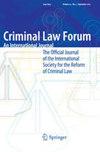Corporate Vehicular Manslaughter Provisions In The Bangladesh Road Transport Act 2018: A Textual Comparison With Their Equivalents in Australia
IF 0.8
Q3 CRIMINOLOGY & PENOLOGY
引用次数: 1
Abstract
The road transport sector in Bangladesh has been simply disorderly for years and gradually going from bad to worse killing about 20,000 people and grievously injuring 50,000 every year as reported by the World Health Organisation. Government transport authorities publicly admit their failure in disciplining the critical sector. The government was ultimately compelled to enact legislation in 2018 following the deaths of two teenage students who were run over by a bus, which triggered nationwide protests effectively paralysing the transport sector for more than a week. To pacify the agitated students, the government enacted the Road Transport Act 2018 which, for the first time, directly imposes criminal responsibility on transport companies, their owners and officers. This article critically examines that corporate liability provisions (liabilities of the companies, their owners, officers, employees – excluding transport workers) from the perspective of vehicular manslaughter in light of their equivalents in Australia, and with sporadic references to common law principles as relevant to both Bangladesh and Australia which have inherited their legal systems from the British colonial rule. We argue that the new provisions have several flaws including the definition of the offence, defences available, and penalties prescribed – which significantly undermine the utility and effectiveness of the new legislation. We provide specific suggestions for amending these provisions aimed at improving road safety in Bangladesh, however, these considerations may also benefit other jurisdictions.2018年孟加拉国道路运输法中的企业车辆过失杀人条款:与澳大利亚等效条款的文本比较
据世界卫生组织(World Health organization)报道,孟加拉国的公路运输部门多年来一直混乱无序,并逐渐恶化,每年造成约2万人死亡,5万人严重受伤。政府交通部门公开承认他们在管理这个关键部门方面的失败。2018年,两名十几岁的学生被一辆公共汽车碾死,引发了全国性的抗议活动,导致交通部门瘫痪了一个多星期,政府最终被迫颁布了立法。为了安抚激动的学生,政府颁布了《2018年道路运输法》,首次直接对运输公司、其所有者和官员追究刑事责任。本文从车辆过失杀人罪的角度,参照澳大利亚的同类条款,批判性地考察了公司责任条款(公司、其所有者、官员、雇员的责任——不包括运输工人),并零星地引用了与孟加拉国和澳大利亚相关的普通法原则,这两个国家的法律制度都继承自英国殖民统治。我们认为,新规定有几个缺陷,包括对犯罪的定义、可用的抗辩和规定的处罚——这大大破坏了新立法的效用和有效性。我们提供了修改这些条款的具体建议,旨在改善孟加拉国的道路安全,然而,这些考虑也可能使其他司法管辖区受益。
本文章由计算机程序翻译,如有差异,请以英文原文为准。
求助全文
约1分钟内获得全文
求助全文
来源期刊

Criminal Law Forum
Multiple-
CiteScore
1.00
自引率
0.00%
发文量
17
期刊介绍:
Criminal Law Forum is a peer-review journal dedicated to the advancement of criminal law theory, practice, and reform throughout the world. Under the direction of an international editorial board, Criminal Law Forum serves the global community of criminal law scholars and practitioners through the publication of original contributions and the dissemination of noteworthy public documents. Criminal Law Forum is published pursuant to an agreement with the Society for the Reform of Criminal Law, based in Vancouver, British Columbia.
 求助内容:
求助内容: 应助结果提醒方式:
应助结果提醒方式:


